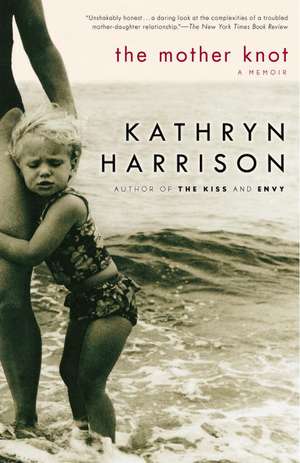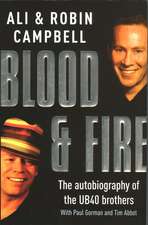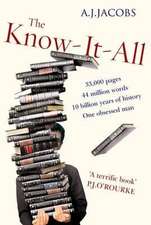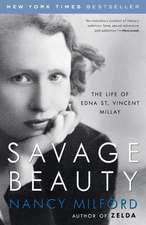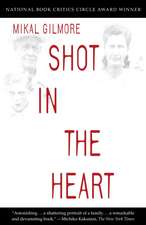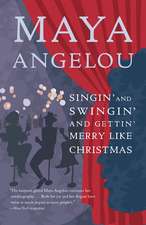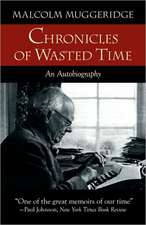The Mother Knot: A Memoir
Autor Kathryn Harrisonen Limba Engleză Paperback – 30 iun 2005
Spare and unflinching, The Mother Knot is Kathryn Harrison’s courageous exploration of her painful feelings about her mother, and of her depression and recovery. Writer, wife, mother of three, Kathryn Harrison finds herself, at age forty-one, wrestling with a black, untamable force that seems to have the power to undermine her sanity and her safety, a darkness that is tied to her relationship with her own mother, dead for many years but no less a haunting presence. Shaken by a family emergency that reveals the fragility of her current happiness, Harrison falls prey to despair and anxiety she believed she’d overcome long before. A relapse of anorexia becomes the tangible reminder of a youth spent trying to achieve the perfection she had hoped would win her mother’s love, and forces her to confront, understand, and ultimately cast out—in startling physical form—the demons within herself. Powerful, insightful, unforgettable, by “a writer of extraordinary gifts” (Tobias Wolff), Kathryn Harrison’s The Mother Knot is a knockout.
From the Hardcover edition.
Preț: 85.09 lei
Nou
Puncte Express: 128
Preț estimativ în valută:
16.28€ • 17.00$ • 13.44£
16.28€ • 17.00$ • 13.44£
Carte disponibilă
Livrare economică 25 martie-08 aprilie
Preluare comenzi: 021 569.72.76
Specificații
ISBN-13: 9780812971507
ISBN-10: 0812971507
Pagini: 96
Dimensiuni: 134 x 206 x 7 mm
Greutate: 0.09 kg
Editura: Random House Trade
ISBN-10: 0812971507
Pagini: 96
Dimensiuni: 134 x 206 x 7 mm
Greutate: 0.09 kg
Editura: Random House Trade
Notă biografică
KATHRYN HARRISON is the author of the novels The Seal Wife, The Binding Chair, Poison, Exposure, and Thicker Than Water. She has also written a memoir, The Kiss, a travel memoir, The Road to Santiago, a biography, Saint Therese of Lisiuex, and a collection of essays, Seeking Rapture. She lives in New York with her husband, the novelist Colin Harrison, and their children.
From the Hardcover edition.
From the Hardcover edition.
Extras
Chapter 1
There's still a bottle of milk in our freezer, six ounces expressed from my breasts and poured into a sterilized container to have on hand should our daughter get hungry when I'm not home. There used to be more frozen bottles, as many as a dozen, but our daughter is three now; she hasn't nursed for almost a year. The single bottle hidden among the foil-wrapped leftovers and cartons of ice cream is one I saved for myself-a benign little keepsake, or so I thought at the time, unable to imagine that the apparently sentimental souvenir would be revealed as a dark, even perverse, fetish.
The daughter for whom I froze my milk is our third child. After she was born I had a tubal ligation. I nursed her longer than I did her older sister and brother because I knew I wouldn't be returning to this one thing I did so well, so happily. Never again, under any other circumstances, would I be able to answer a loved one's desire so completely. My daughter passed one after another milestone of babyhood-she walked, talked, used her full set of teeth to eat whatever she wanted-and still I postponed the separation of weaning.
By May 2002 my youngest child was twenty-six months old and lifted my shirt only at bedtime or when she needed reassurance, comfort that was hers whether she nursed or not. At the end of that month I used a business trip to help me accomplish what I'd avoided as long as I was near her. All day and all night for a week I wore a tight sports bra, the effect of which was to bind my aching breasts and suppress the production of milk. When I showered my chest throbbed and my nipples leaked. For a few days they did. Then the body began to understand; the swelling diminished.
Back home, despite a sudden June heat wave, I wore high-necked shirts and tucked them into my waistband. When my daughter asked to nurse, fondling me through the fabric, I told her how proud I was to have such a wonderful big girl, and together we listed the differences between big girls and babies, who drink from their mothers and can't have apple juice or chocolate milk in a cup. A secure and cheerful child, my daughter adapted quickly. I, however, suffered a plunge in mood and waited for what didn't happen: to feel better, or at least less bereft.
Summer became a season of compulsive work and little else. Diversions I'd enjoyed in the past-trips to the beach, dinner parties, movies, tennis-were leached of pleasure, colorless, tedious, exhausting. Everything required more energy than I had, especially pretending that I wasn't depressed. Sleep was elusive, and I began, on those nights I was awake hours after turning off the light, to sneak a half milligram of stale Xanax.
The tranquilizer had been prescribed four years earlier, when I'd suffered a depression serious enough that, once hospitalized, I found a metal mirror in my bathroom, not a glass one I could break and use against myself. The admitting nurse searched my overnight bag and confiscated my disposable razor; she told me that there were no circumstances under which I was permitted to close my door and that if I wanted to shave my legs or armpits I could do so only with supervision. But all I wanted was nightfall, the eight o'clock distribution of pills that hastened the patients to sleep, silencing the hallways.
Xanax was valuable; I'd never considered discarding the fifty or so that remained after I recovered. I still had enough that for weeks I could avoid acknowledging the anxiety and insomnia that had characterized the onset of my previous breakdown. Soon it would be September, I told myself, the month I'd always loved best, the one that, when I was a child, had rescued me from a long season spent with my family, and offered then what I thought it would now: the solace of routine.
Our older daughter, twelve, and our son, ten, began school immediately after Labor Day. One week passed, then another. I was still waiting for a discernible lift in my spirits when, on Tuesday, September 24, our son fell ill. Although he'd never before had respiratory problems-at least not any of which we'd been aware-he was stricken with a severe asthma attack and spent five days in the hospital, three of them in pediatric ICU. Day after night after day I sat beside his bed, trying not to watch the monitor that displayed the jagged peaks and troughs of his elevated heart rate, the immediate fall in the level of oxygen in his blood when I removed his mask for a moment to untangle a snarl of tubes pulling on his IV. Treated every other hour with albuterol, a bronchodilator with stimulant side effects, my child slept little but drifted in and out of half-waking nightmares. Under the spell of one of these he screamed out in terror, and when I approached to reassure him, he didn't recognize me, he screamed louder.
What had he seen that frightened him? I asked myself. What kind of monster?
By now I'd fallen prey to the sinister associations that can attend deepening depression. Did this explain why I failed to distinguish one oxygen mask from another? The piece of molded plastic that fit over my son's nose and mouth summoned a mask I'd seen before, another clear green one I'd adjusted just as I did his. My mother had used it to breathe when she was dying of breast cancer, choking on it, her lungs filled with metastases, her hospital bed ensnared in a similar thicket of monitors and coils of tubing, gleaming metal gas cocks poking through the wall, a bag of blood hanging from a hook.
The chime of an IV pump, the hiss of oxygen, the unanswered telephones and endless paging of doctors, the broadcast blips of beating hearts: an electronic clamor muffled present groans and cries and returned me to my mother's bedside, to her tubes and her wires and her suffering-and to my panic at losing her before we could manage a reconciliation or even an honest farewell.
Before my son's illness, I'd congratulated myself for reaching a kind of acceptance of my tortured relationship with my mother. I'd been her only child, the baby she wasn't prepared to raise, the daughter she gave to her parents. I was the girl who loved and hated her mother in equal measure, whose longing was obvious and whose rage had always been concealed, even-especially-from herself. But I'd thought all that was behind me. I'd even told my analyst I was quitting therapy because I was increasingly bored by what had once compelled me: hashing and rehashing past agonies.
Fall 2002 was a hard season for our family, and particularly for our son. Whenever he got a little better he subsequently relapsed, relying on as many as six drugs to keep him well enough to go to school. On the worst days he was tethered to a nebulizer for hours, inhaling albuterol and a steroid called Pulmicort from the plastic mouthpiece at the end of a flexible tube. During the treatments he did homework or reread Tolkien's Lord of the Rings. If we let him, he watched the film version of the first book in the trilogy, The Fellowship of the Ring, a video we rented eleven times before buying our own copy. Over and over, our son followed a story he knew by heart, mesmerized by the struggle of good to overcome a terrifying, unknowable evil.
Having taken health for granted, our son was shocked by his new status as a sick child, sullen en route to doctor appointments, scared to go into the pool for swim class. For years he'd understood himself as an athlete, with reason. Now he worried that his Little League career and his dreams of a glorious future as a New York Yankee would be taken from him.
A detail-oriented person, I extracted some comfort from reliably managing my son's care, executing each and every doctor's order to the letter. I sat for hours before a computer screen, not working but pursuing online information about respiratory reactive disease, the clinical name for asthma. Inevitably, I strayed from the medical jargon of corporate websites into the hysteria of chat rooms, other parents' horror stories that left me reciting helpless prayers-to fate, to whatever power might keep a child from harm, to a God whose presence I couldn't feel. At bedtime I kneeled beside my son in the dark and silently invited his disease into my body.
One night, soon after he was discharged from the hospital, my son walked in his sleep, calling out for me on each stair down to the floor where my husband and I slept. Bleary with exhaustion, I assumed from the urgency of the calls that he was having another asthma attack, and that by morning we'd be back in the hospital. At breakfast my son didn't remember what had happened. But I remained sufficiently unnerved that for weeks I heard him call me in the night. Each time, I'd run upstairs to his bed and find him deeply asleep, his face erased of anxiety, his forehead dry and cool. Blue light from the street spilled over his covers, and I watched my little boy as he breathed. The stricken cries I'd heard so clearly hadn't come from my son. Though I hadn't been asleep, somehow I'd dreamed them.
Too scared to go back to my room, I would remain by his bed until morning. I'd sit in the old white rocker that had been in my own childhood bedroom, then slip away at dawn, before he could wake and find me there.
Several times a day I recorded his "peak flow," a measure of lung capacity and a critical tool for predicting, and thus preventing, asthma attacks. I graphed the readings in a booklet made for that purpose, so we could follow, hour by hour, day by day, fluctuations in our son's ability to breathe. My husband joked that the numbers on the handheld meter might just as dependably be interpreted as increments of mood-mine. The higher my son's flows, the more optimism and calm I was able to summon. When the flows dipped, even a little, I panicked. How could I explain my overreaction to my husband when I didn't understand it myself?
"I feel like this is my fault," I said, sobbing, night after night. As soon as the children were asleep, I succumbed to the dread I'd managed, barely, to keep hidden from them. I was afraid our son would be taken from us. From me.
"Your fault because you had asthma when you were a child?" my husband asked, puzzled.
"Maybe," I said. But it was something else.
It had been four months before my son's hospitalization that I'd stopped nursing, relinquished that cherished perception of myself as my children's primal source of sustenance and love. Now the onset of my son's asthma struck me as an indication of my new impotence. Worse, and more irrationally, it seemed to reveal me as dangerous. I saw-felt-a black, destructive spirit, dybbuk or dervish, twisting out of my chest, a force of corruption that sprang from me and infected my son, choked and smothered him. Though I knew myself to be a good mother, a loving and responsible mother, it seemed to me that not only had I failed to protect my child, to stand as a barrier between him and the perils of the world, but that I'd been the inadvertent agent of his illness. It made no sense-I did know that-and I recognized my husband's faith in our son's recovery as one founded on that child's underlying health, his unusual strength. Given time, we'd learn what triggered his asthma and how to avoid or handle any future attacks. His father was sure of this. Why couldn't I be?
Again and again I returned to the nightmare my son had had in the hospital, his screams when I came to comfort him. What was it that he'd felt, or seen? A threatening presence? The opposite of what a mother should be? Of the paragon I'd tried to be in contrast to my own mother?
Seventeen when she got pregnant, my mother had allowed my father, also seventeen, to talk her out of an abortion. Perhaps a baby could help her accomplish what she hadn't on her own: escape from her jealous mother, my grandmother, who sabotaged her every attempt at independence. As she described it years later, when she was seeing a therapist, I was to have been a surrogate, a new daughter for her mother to manipulate, so that she herself could slip away. My mother married my father on his eighteenth birthday, her pregnancy too advanced to allow for a white dress or reception by those who would have been less celebrants than witnesses to her shame. Before a year had passed, she'd discarded my father and endured a nervous collapse. Attacks of agoraphobia imprisoned her in the very house she'd risked so much to escape. My mother lost the rest of her short life to protracted and never decisive battles with my grandmother, a war by turns hot and cold for which she dressed impeccably and always wore makeup, her misery-and her anger-visible in almost every family photograph.
I was thirteen when she explained how she'd used me as a stand-in for herself. Oddly, or so I thought at the time, she chose the word hostage to describe my role. By thirteen I was reading novels by the Brontë sisters and Dickens, even Tolstoy, so she could reasonably assume I'd understand her words, the simple transaction she described. But I reacted with dumb incomprehension, unable even to nod. Was there any age at which I could have accepted her reluctance to hold or to touch me, any rationale that might excuse the critical, sometimes disgusted eye she trained on so expensive a failure? Not only had I not purchased freedom for my mother; as it turned out, I'd spelled further entanglement. My mother, like Lot's wife, had made the mistake of looking back.
My grandparents dedicated themselves to my care. They gave me the bedroom between theirs and my mother's; they bought me clothes and paid for
my private-school education. My grandmother made school lunches, wrapping sandwiches in waxed paper and placing them carefully on top of the apple so they wouldn't get squashed. Sometimes my grandfather drew a picture on the brown lunch bag, a face or an animal rendered comic by the tremor in his hand. For her part, my mother undertook to refine me, a child she'd agreed to bear and who might reflect badly on her now that I was irrevocably incarnate-a person, a life rather than an idea.
Ballet and Christian Science Sunday school, lace tights, table manners, how to walk like a lady without scuffing the shiny toes of my black Mary Janes, how to blunt my appetite with a glass of water before every meal: most of these lessons backfired. She tried and I tried, but we couldn't save me from my clumsiness, we couldn't chisel away evidence of my father, his stocky legs and studious scowl, his stubborn jaw.
From the Hardcover edition.
There's still a bottle of milk in our freezer, six ounces expressed from my breasts and poured into a sterilized container to have on hand should our daughter get hungry when I'm not home. There used to be more frozen bottles, as many as a dozen, but our daughter is three now; she hasn't nursed for almost a year. The single bottle hidden among the foil-wrapped leftovers and cartons of ice cream is one I saved for myself-a benign little keepsake, or so I thought at the time, unable to imagine that the apparently sentimental souvenir would be revealed as a dark, even perverse, fetish.
The daughter for whom I froze my milk is our third child. After she was born I had a tubal ligation. I nursed her longer than I did her older sister and brother because I knew I wouldn't be returning to this one thing I did so well, so happily. Never again, under any other circumstances, would I be able to answer a loved one's desire so completely. My daughter passed one after another milestone of babyhood-she walked, talked, used her full set of teeth to eat whatever she wanted-and still I postponed the separation of weaning.
By May 2002 my youngest child was twenty-six months old and lifted my shirt only at bedtime or when she needed reassurance, comfort that was hers whether she nursed or not. At the end of that month I used a business trip to help me accomplish what I'd avoided as long as I was near her. All day and all night for a week I wore a tight sports bra, the effect of which was to bind my aching breasts and suppress the production of milk. When I showered my chest throbbed and my nipples leaked. For a few days they did. Then the body began to understand; the swelling diminished.
Back home, despite a sudden June heat wave, I wore high-necked shirts and tucked them into my waistband. When my daughter asked to nurse, fondling me through the fabric, I told her how proud I was to have such a wonderful big girl, and together we listed the differences between big girls and babies, who drink from their mothers and can't have apple juice or chocolate milk in a cup. A secure and cheerful child, my daughter adapted quickly. I, however, suffered a plunge in mood and waited for what didn't happen: to feel better, or at least less bereft.
Summer became a season of compulsive work and little else. Diversions I'd enjoyed in the past-trips to the beach, dinner parties, movies, tennis-were leached of pleasure, colorless, tedious, exhausting. Everything required more energy than I had, especially pretending that I wasn't depressed. Sleep was elusive, and I began, on those nights I was awake hours after turning off the light, to sneak a half milligram of stale Xanax.
The tranquilizer had been prescribed four years earlier, when I'd suffered a depression serious enough that, once hospitalized, I found a metal mirror in my bathroom, not a glass one I could break and use against myself. The admitting nurse searched my overnight bag and confiscated my disposable razor; she told me that there were no circumstances under which I was permitted to close my door and that if I wanted to shave my legs or armpits I could do so only with supervision. But all I wanted was nightfall, the eight o'clock distribution of pills that hastened the patients to sleep, silencing the hallways.
Xanax was valuable; I'd never considered discarding the fifty or so that remained after I recovered. I still had enough that for weeks I could avoid acknowledging the anxiety and insomnia that had characterized the onset of my previous breakdown. Soon it would be September, I told myself, the month I'd always loved best, the one that, when I was a child, had rescued me from a long season spent with my family, and offered then what I thought it would now: the solace of routine.
Our older daughter, twelve, and our son, ten, began school immediately after Labor Day. One week passed, then another. I was still waiting for a discernible lift in my spirits when, on Tuesday, September 24, our son fell ill. Although he'd never before had respiratory problems-at least not any of which we'd been aware-he was stricken with a severe asthma attack and spent five days in the hospital, three of them in pediatric ICU. Day after night after day I sat beside his bed, trying not to watch the monitor that displayed the jagged peaks and troughs of his elevated heart rate, the immediate fall in the level of oxygen in his blood when I removed his mask for a moment to untangle a snarl of tubes pulling on his IV. Treated every other hour with albuterol, a bronchodilator with stimulant side effects, my child slept little but drifted in and out of half-waking nightmares. Under the spell of one of these he screamed out in terror, and when I approached to reassure him, he didn't recognize me, he screamed louder.
What had he seen that frightened him? I asked myself. What kind of monster?
By now I'd fallen prey to the sinister associations that can attend deepening depression. Did this explain why I failed to distinguish one oxygen mask from another? The piece of molded plastic that fit over my son's nose and mouth summoned a mask I'd seen before, another clear green one I'd adjusted just as I did his. My mother had used it to breathe when she was dying of breast cancer, choking on it, her lungs filled with metastases, her hospital bed ensnared in a similar thicket of monitors and coils of tubing, gleaming metal gas cocks poking through the wall, a bag of blood hanging from a hook.
The chime of an IV pump, the hiss of oxygen, the unanswered telephones and endless paging of doctors, the broadcast blips of beating hearts: an electronic clamor muffled present groans and cries and returned me to my mother's bedside, to her tubes and her wires and her suffering-and to my panic at losing her before we could manage a reconciliation or even an honest farewell.
Before my son's illness, I'd congratulated myself for reaching a kind of acceptance of my tortured relationship with my mother. I'd been her only child, the baby she wasn't prepared to raise, the daughter she gave to her parents. I was the girl who loved and hated her mother in equal measure, whose longing was obvious and whose rage had always been concealed, even-especially-from herself. But I'd thought all that was behind me. I'd even told my analyst I was quitting therapy because I was increasingly bored by what had once compelled me: hashing and rehashing past agonies.
Fall 2002 was a hard season for our family, and particularly for our son. Whenever he got a little better he subsequently relapsed, relying on as many as six drugs to keep him well enough to go to school. On the worst days he was tethered to a nebulizer for hours, inhaling albuterol and a steroid called Pulmicort from the plastic mouthpiece at the end of a flexible tube. During the treatments he did homework or reread Tolkien's Lord of the Rings. If we let him, he watched the film version of the first book in the trilogy, The Fellowship of the Ring, a video we rented eleven times before buying our own copy. Over and over, our son followed a story he knew by heart, mesmerized by the struggle of good to overcome a terrifying, unknowable evil.
Having taken health for granted, our son was shocked by his new status as a sick child, sullen en route to doctor appointments, scared to go into the pool for swim class. For years he'd understood himself as an athlete, with reason. Now he worried that his Little League career and his dreams of a glorious future as a New York Yankee would be taken from him.
A detail-oriented person, I extracted some comfort from reliably managing my son's care, executing each and every doctor's order to the letter. I sat for hours before a computer screen, not working but pursuing online information about respiratory reactive disease, the clinical name for asthma. Inevitably, I strayed from the medical jargon of corporate websites into the hysteria of chat rooms, other parents' horror stories that left me reciting helpless prayers-to fate, to whatever power might keep a child from harm, to a God whose presence I couldn't feel. At bedtime I kneeled beside my son in the dark and silently invited his disease into my body.
One night, soon after he was discharged from the hospital, my son walked in his sleep, calling out for me on each stair down to the floor where my husband and I slept. Bleary with exhaustion, I assumed from the urgency of the calls that he was having another asthma attack, and that by morning we'd be back in the hospital. At breakfast my son didn't remember what had happened. But I remained sufficiently unnerved that for weeks I heard him call me in the night. Each time, I'd run upstairs to his bed and find him deeply asleep, his face erased of anxiety, his forehead dry and cool. Blue light from the street spilled over his covers, and I watched my little boy as he breathed. The stricken cries I'd heard so clearly hadn't come from my son. Though I hadn't been asleep, somehow I'd dreamed them.
Too scared to go back to my room, I would remain by his bed until morning. I'd sit in the old white rocker that had been in my own childhood bedroom, then slip away at dawn, before he could wake and find me there.
Several times a day I recorded his "peak flow," a measure of lung capacity and a critical tool for predicting, and thus preventing, asthma attacks. I graphed the readings in a booklet made for that purpose, so we could follow, hour by hour, day by day, fluctuations in our son's ability to breathe. My husband joked that the numbers on the handheld meter might just as dependably be interpreted as increments of mood-mine. The higher my son's flows, the more optimism and calm I was able to summon. When the flows dipped, even a little, I panicked. How could I explain my overreaction to my husband when I didn't understand it myself?
"I feel like this is my fault," I said, sobbing, night after night. As soon as the children were asleep, I succumbed to the dread I'd managed, barely, to keep hidden from them. I was afraid our son would be taken from us. From me.
"Your fault because you had asthma when you were a child?" my husband asked, puzzled.
"Maybe," I said. But it was something else.
It had been four months before my son's hospitalization that I'd stopped nursing, relinquished that cherished perception of myself as my children's primal source of sustenance and love. Now the onset of my son's asthma struck me as an indication of my new impotence. Worse, and more irrationally, it seemed to reveal me as dangerous. I saw-felt-a black, destructive spirit, dybbuk or dervish, twisting out of my chest, a force of corruption that sprang from me and infected my son, choked and smothered him. Though I knew myself to be a good mother, a loving and responsible mother, it seemed to me that not only had I failed to protect my child, to stand as a barrier between him and the perils of the world, but that I'd been the inadvertent agent of his illness. It made no sense-I did know that-and I recognized my husband's faith in our son's recovery as one founded on that child's underlying health, his unusual strength. Given time, we'd learn what triggered his asthma and how to avoid or handle any future attacks. His father was sure of this. Why couldn't I be?
Again and again I returned to the nightmare my son had had in the hospital, his screams when I came to comfort him. What was it that he'd felt, or seen? A threatening presence? The opposite of what a mother should be? Of the paragon I'd tried to be in contrast to my own mother?
Seventeen when she got pregnant, my mother had allowed my father, also seventeen, to talk her out of an abortion. Perhaps a baby could help her accomplish what she hadn't on her own: escape from her jealous mother, my grandmother, who sabotaged her every attempt at independence. As she described it years later, when she was seeing a therapist, I was to have been a surrogate, a new daughter for her mother to manipulate, so that she herself could slip away. My mother married my father on his eighteenth birthday, her pregnancy too advanced to allow for a white dress or reception by those who would have been less celebrants than witnesses to her shame. Before a year had passed, she'd discarded my father and endured a nervous collapse. Attacks of agoraphobia imprisoned her in the very house she'd risked so much to escape. My mother lost the rest of her short life to protracted and never decisive battles with my grandmother, a war by turns hot and cold for which she dressed impeccably and always wore makeup, her misery-and her anger-visible in almost every family photograph.
I was thirteen when she explained how she'd used me as a stand-in for herself. Oddly, or so I thought at the time, she chose the word hostage to describe my role. By thirteen I was reading novels by the Brontë sisters and Dickens, even Tolstoy, so she could reasonably assume I'd understand her words, the simple transaction she described. But I reacted with dumb incomprehension, unable even to nod. Was there any age at which I could have accepted her reluctance to hold or to touch me, any rationale that might excuse the critical, sometimes disgusted eye she trained on so expensive a failure? Not only had I not purchased freedom for my mother; as it turned out, I'd spelled further entanglement. My mother, like Lot's wife, had made the mistake of looking back.
My grandparents dedicated themselves to my care. They gave me the bedroom between theirs and my mother's; they bought me clothes and paid for
my private-school education. My grandmother made school lunches, wrapping sandwiches in waxed paper and placing them carefully on top of the apple so they wouldn't get squashed. Sometimes my grandfather drew a picture on the brown lunch bag, a face or an animal rendered comic by the tremor in his hand. For her part, my mother undertook to refine me, a child she'd agreed to bear and who might reflect badly on her now that I was irrevocably incarnate-a person, a life rather than an idea.
Ballet and Christian Science Sunday school, lace tights, table manners, how to walk like a lady without scuffing the shiny toes of my black Mary Janes, how to blunt my appetite with a glass of water before every meal: most of these lessons backfired. She tried and I tried, but we couldn't save me from my clumsiness, we couldn't chisel away evidence of my father, his stocky legs and studious scowl, his stubborn jaw.
From the Hardcover edition.
Recenzii
Praise for The Mother Knot
“Harrison’s fascinating memoir nails a never-before-uttered psychological truth. A drama with her own child forces the writer to unknot—with great agony—the bonds that enslaved her to the memory of her own capricious mother, who almost manages—even from the grave—to destroy her only surviving child. This book should be required reading for anyone who ever had a mother.”
—MARY KARR, author of The Liars’ Club
“Mothers: They birth us, mold us, influence who we are and who we can become. Even in memory, their hold on daughters is complete. I loved The Mother Knotfor its honest assessment of the ongoing impact this most primal of bonds can have on an adult daughter. In prose that manages to be both luminous and economical, in sentences that feel as effortless as breathing, Kathryn Harrison poignantly details the lengths to which one daughter must go, in order to finally let go.”
—HOPE EDELMAN, author of Motherless Daughters
“I am not alone. Kathryn Harrison’s new memoir has revealed that poignantly, beautifully, the way the best literature always does. Sure, the details of her story are unique, but the haunting emotions that weave together daughterhood and motherhood are universal. I just couldn’t put The Mother Knot down.”
—MARTHA MCPHEE, author of Gorgeous Lies
“The Mother Knot is a prose poem dedicated to performing a difficult task at which Kathryn Harrison always elegantly succeeds. Here, once again, she has found great beauty in limning hard truths. She is one of the most compelling writers I know, a true artist whose formidable talent is matched by her courage.”
—ELIZABETH BERG, author of The Art of Mending
“Kathryn Harrison’s new memoir, written with razor blades and honey, is a compelling mother-daughter study, full of truths about our lives. The book is moving and beautifully written.”
—ERICA JONG, author of Sappho’s Leap
From the Hardcover edition.
“Harrison’s fascinating memoir nails a never-before-uttered psychological truth. A drama with her own child forces the writer to unknot—with great agony—the bonds that enslaved her to the memory of her own capricious mother, who almost manages—even from the grave—to destroy her only surviving child. This book should be required reading for anyone who ever had a mother.”
—MARY KARR, author of The Liars’ Club
“Mothers: They birth us, mold us, influence who we are and who we can become. Even in memory, their hold on daughters is complete. I loved The Mother Knotfor its honest assessment of the ongoing impact this most primal of bonds can have on an adult daughter. In prose that manages to be both luminous and economical, in sentences that feel as effortless as breathing, Kathryn Harrison poignantly details the lengths to which one daughter must go, in order to finally let go.”
—HOPE EDELMAN, author of Motherless Daughters
“I am not alone. Kathryn Harrison’s new memoir has revealed that poignantly, beautifully, the way the best literature always does. Sure, the details of her story are unique, but the haunting emotions that weave together daughterhood and motherhood are universal. I just couldn’t put The Mother Knot down.”
—MARTHA MCPHEE, author of Gorgeous Lies
“The Mother Knot is a prose poem dedicated to performing a difficult task at which Kathryn Harrison always elegantly succeeds. Here, once again, she has found great beauty in limning hard truths. She is one of the most compelling writers I know, a true artist whose formidable talent is matched by her courage.”
—ELIZABETH BERG, author of The Art of Mending
“Kathryn Harrison’s new memoir, written with razor blades and honey, is a compelling mother-daughter study, full of truths about our lives. The book is moving and beautifully written.”
—ERICA JONG, author of Sappho’s Leap
From the Hardcover edition.
